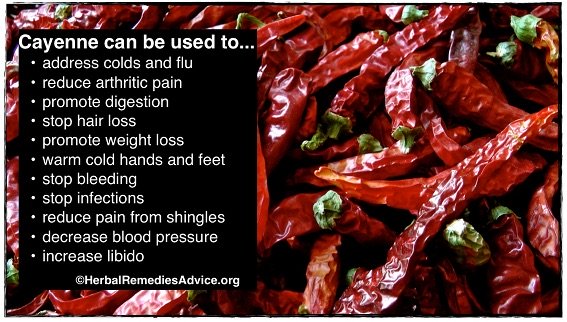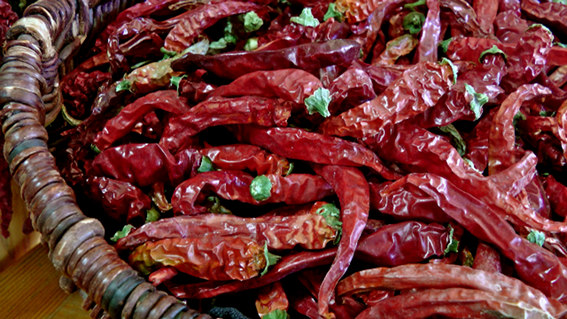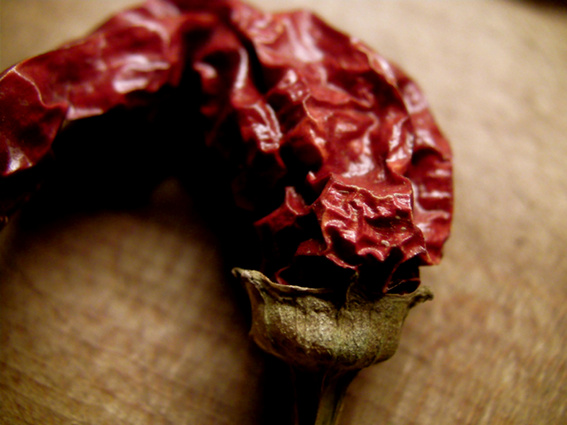Get weekly tips, recipes, and my Herbal Jumpstart e-course! Sign up for free today.

Health Benefits of Cayenne Pepper
Share this! |
|
In the first part of this article I covered general cayenne pepper benefits and information.
In this second and last part I will specifically cover the health benefits of cayenne pepper as understood by herbalists.
What is an Herbal Stimulant?
When you hear the word stimulant it is easy for thoughts of caffeine or methamphetamines to come to mind. These drug-like constituents are indeed stimulants.
But in the herbal world stimulants have a broader, more energetic meaning. Simply defined, a stimulant is something that increases the energy output of a system or organ.
Caffeine and meth are nervous system stimulants. They increase the energy output of the nervous system, leaving the consumer feeling hyped-up or wired.
Exercise can be thought of as a stimulant too. Rapid movement increases the energy output of the cardiovascular system, respiratory system, nervous system, etc.
Cayenne is also a stimulant. It specifically effects the cardiovascular system, mucous membranes and digestion.
Cayenne Pepper Boost Metabolism
People with cold and stagnant digestion have a difficult time transforming food into nutrients. They are often experiencing fatigue due to the exhaustive energy being used to attempt digestion. They are further disadvantaged because their poor digestion leaves them lacking the nutrients needed to feel vibrant.
Symptoms of stagnant and cold digestion include:
- bloating
- belching
- sour regurgitation
- nausea
- foul breath
- gas
- lack of appetite
- loose stools
- undigested food in stools
- heartburn
- feeling of coldness in the limbs or in the stomach
- tongue is swollen, wet, with possible heavy white coating
- abdominal pain that is relieved with pressure
Cayenne is a premier herb for warming and stimulating digestion. It can be added to foods, taken as tea or a capsule (careful not to take too much!) or used in a tincture.
Health Benefits of Cayenne Pepper for the Heart
Cayenne is a powerful ally for the heart and cardiovascular system. It can regulate cholesterol levels and reduce platelet aggregation, thus lessening a chance of forming a blood clot.
Cayenne is also packed full of antioxidants. A diet high in antioxidants has been shown to decrease free radical damage to the arteries and support the healthy functioning of the whole cardiovascular system.
[Cayenne]
is the most powerful and persistent heart stimulant known. It increases
arterial force, enlarges its calibre, and slightly increases its
frequency. Its influence is permanent and reaches every organ through
its primary influence upon the circulation-the heart first, then the
arteries, the capillaries and the nerves.
- T.J. Lyle, 1897, Physio-Medical Therapeutics
Dr. Christopher famously used cayenne to stop people from having heart attacks. His preferred method of administration was a hot cayenne tea made with one teaspoon of cayenne pepper to one cup of water.
In
heart attack, Dr. Christopher always considered cayenne pepper to be a
specific. He said he never lost a case. I have had three cases where the
symptoms looked like heart attack and Capsicum (homeopathic 6x potency)
relieved in all cases. This remedy works because it opens the
peripheral capillaries, increases circulation to the periphery and
decreases the pressure on the heart from pooling of blood in the
interior.
- Matt Wood in Plant Healer Magazine #6
Health Benefits of Cayenne Pepper for Pain Relief
Capsaicin, a major constituent of cayenne peppers, blocks substance P which relays pain sensations in your body. Cayenne is used topically to relieve many different types of pain, including diabetic neuropathy, shingles, migraine headaches, back aches, arthritis, menstrual cramps and other aches and pains.
Tincture
of Capsicum is an important topical stimulant, rubefacient and
counter-irritant. By its revulsive action it often relieves local pain.
Painted upon chilblains it quickly gives relief.
- Harvey Wickes Felter, M.D., 1922
The Eclectic Materia Medica, Pharmacology and Therapeutics
Health Benefits of Cayenne Pepper for Colds and the Flu
Cayenne peppers can help prevent a cold or flu as well as shorten the duration of a cold or flu. They bring heat to the body, which can help to dispel coldness (in Traditional Chinese Medicine some colds and the flu are brought on by a cold invasion). Sweating therapies, using saunas or hot baths as well as internal medicines like cayenne are a long-celebrated way to stop a cold in its tracks.
Cayenne also promotes secretions from the mucous membranes. Mucus is loaded with antibodies and is a powerful immune system response to an invading pathogen. If the cold or the flu has progressed and the person has stuffed up sinuses, cayenne peppers will quickly drain them! Moving congested mucus lessens the possibility of a secondary infection in the sinuses.
Cayenne peppers are high in Vitamin A, which is essential to mucus membrane health. Your mucus membranes are an important part of your immune system and keeping them healthy helps to prevent infections.
You can treat a cold very effectively with nothing but chilies if you can get enough down.
-Karta Purkh Singh Khalsa and Robin Landis
Herbal Defense
Cayenne Pepper Benefits to Stop Bleeding
Have you ever cut yourself while chopping food in the kitchen? Next time, reach for cayenne powder to quickly and effectively stop the bleeding. Cayenne’s antimicrobial properties can also prevent infections.
Health Benefits of Cayenne Pepper for Digestive Ulcers
Cayenne and other spicy peppers were once blamed for causing ulcers, but now are accepted as a natural treatment for ulcers. Cayenne supports the health of the lining of the stomach, promotes tissue healing by bringing blood to the area, and addresses secondary infections like the H. pylori bacterial infection that are often seen concurrently with ulcers. It also blocks substance P which transmits pain, thus relieving pain associated with ulcers.
Cayenne Pepper Benefits for Aging Gracefully
Cayenne peppers increase our vitality, which is helpful for people with any symptoms of deficiency and stagnation! Cayenne also increases digestive function, is full of antioxidants and is a strong general anti-inflammatory. It supports a healthy heart and helps to regulate blood sugar levels.
Capsicum
is of value in many functional nervous troubles with debility and
repressed secretions, and for the aged it is one of the few medicines
that should be widely heralded for its power to stimulate and preserve
gastric tone and prolong life. In the debility of the young or old, but
particularly in old persons, when the body-heat is low, vitality
depressed, and reaction sluggish, it is an agent of power for good.
Tired, painful muscles, stiffened joints, and relaxation of tissue are
common conditions in the elderly that are, in a measure at least, helped
by capsicum.
- Harvey Wickes Felter, M.D., 1922
The Eclectic Materia Medica, Pharmacology and Therapeutics
Cayenne Pepper for Weight Loss and Blood Sugar Control
Cayenne peppers consumed in even small amounts have been shown to lower blood sugar. Caution: if you are taking insulin you may need to have your levels adjusted if you consume cayenne regularly.
Cayenne has also been studied extensively for its ability to facilitate weight loss. Scientists hypothesize that cayenne prolongs satiety, resulting in fewer calories consumed, and increases a person’s internal heat, thus helping them burn more calories.
Cayenne Herb Preparations
The highest amount of capsaicin is located in the lining of the seeds and the membrane from which the seeds hang. You can decrease the heat of whole cayenne by first removing the seeds.
Cayenne is a great spice for many culinary dishes. If you buy cayenne powder, buy it in small amounts because it does lose its zing fairly quickly. I bought a pound of cayenne powder two years ago and am just about to finish it up. I’ve noticed that I use at least twice the amount I would normally use with a freshly powdered plant.
Cayenne is often added in minute amounts to tincture formulas. It can warm up a formula and, because it stimulates cardiovascular function, can disperse the herbal medicine more quickly throughout the body.
It can be infused into oils and made into salves for topical treatments of aches and pains. When applying the oils and salves, be sure to take measures to avoid later touching your cayenne-infused fingers to your eyes. (See special considerations below).
See my simple cayenne salve recipe here.
Samuel Thompson used cayenne in tea blends and it is an ingredient in many composition powder recipes. Here’s an example of one of those recipes by Harold Ward in his Herbal Manual.
Composition Powder
- Bayberry Bark (powdered) 1 ounce
- Wild Ginger 1/2 ounce*
- Cayenne 1 drachm
A teaspoonful of the mixture to a teacupful of boiling water is taken warm at bed-time to ward off the effects of chill, and as a general stimulant.
*We now know not to consume wild ginger because of toxicity concerns; substitute store-bought ginger
Some dosage suggestions for cayenne: Always start low and slowly increase the amount to avoid unwanted effects.
- cayenne tea: one tsp of cayenne powder per cup of water, 2 – 4 teaspoons a day
- cayenne tincture: 5 – 15 drops
- cayenne pepper capsules: 2 – 4 grams a day
- cayenne liniment: 1:8 dilution
Special Considerations
Cayenne is very irritating to the eyes. If you have contacts or if you are preparing a lot of cayenne peppers you may want to wear gloves. I’ve heard many stories of people burning their eyes even many hours after contact and many hand washings later.
Cayenne is commonly used in pepper spray devices. In the past five years more than 60 deaths have been attributed to law enforcement use of pepper spray in the United States.
Cayenne shouldn’t be taken in large amounts during pregnancy. People on warfarin or other blood-thinning pharmaceuticals should talk to their doctor before using cayenne.
Summary
Reading the preceding monograph you would think that cayenne is good for anything under the sun. I didn’t even mention the use of cayenne pepper for hair growth on the scalp. That’s right, it does all the above and addresses hair loss as well!
However, your success with using cayenne is determined by how well you match the herb to the person. Here are two different quotes from herbal masters on the specific indications of cayenne.
A
full and hard pulse does not admit it; though a creeping, wiry,
unsteady and very small pulse calls for it. It is out of place
altogether in inflammatory fever or any inflammatory condition; in
gastric irritation, or inflammation, in acute sensitiveness of the
throat and lungs, in a hot and burning skin with a large pulse, and in
any and every similar condition. It is as much out of place under such
circumstances as fire would be in July, with the thermometer at 100
degrees”
- William Cook, M.D., 1869
The Physiomedical Dispensatory
Specific indications: Middle aged couch potatoes who reminisce about the past but do not exercise; red, darkish complexion from capillary stagnation, cool to the touch, as the circulation does not warm the surface; large, flabby tissues, red and darkish; unequal distribution of the blood with unequal pulse; feeble rapid pulse with septic, mortifying, putrefactive tendencies. - Matt Wood in Plant Healer Magazine #6

Rosalee is an herbalist and author of the bestselling book Alchemy of Herbs: Transform Everyday Ingredients Into Foods & Remedies That Healand co-author of the bestselling book Wild Remedies: How to Forage Healing Foods and Craft Your Own Herbal Medicine. She's a registered herbalist with the American Herbalist Guild and has taught thousands of students through her online courses. Read about how Rosalee went from having a terminal illness to being a bestselling author in her full story here.


